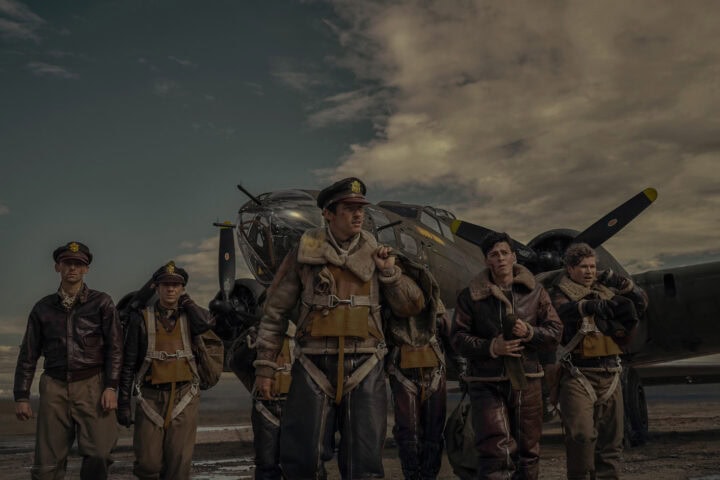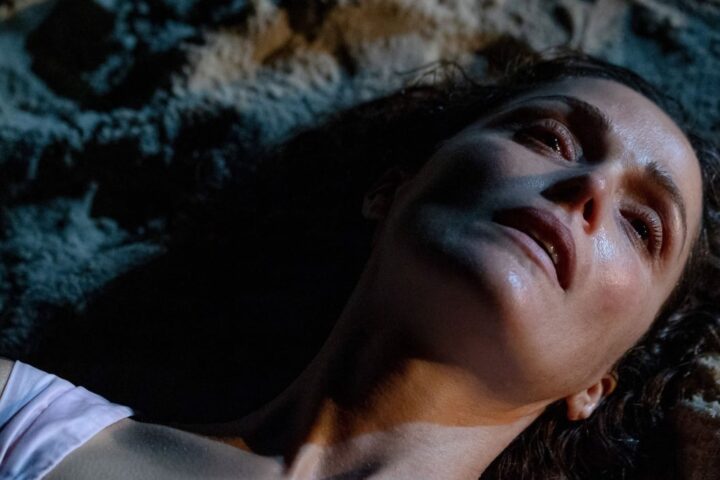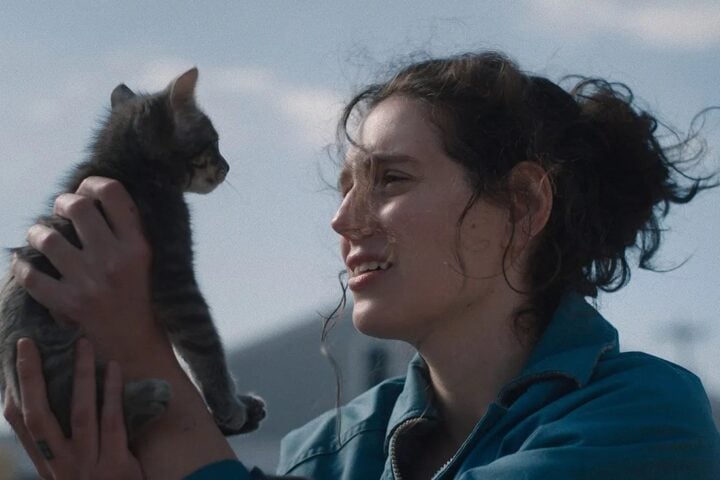Inspired by such plummy wartime satires as Robert Altman’s M*A*S*H* and Ernst Lubitsch’s To Be or Not to Be, writer-director Hailey Gates’s Atropia looks at the U.S. invasion of Iraq and the War on Terror with a cockeyed air of farcical anti-drama. And despite its lack of apparent insight, the film trips and stumbles its way into a stirring anti-war message through a mountain of inspired inanities and heartfelt romance.
Fayruz (Alia Shawkat) is the best actor in Atropia, a.k.a. “The Box,” a fake country set up in the California desert as an immersive live-play scenario to train American combat troops before they deploy for Iraq. Giving her all to roles such as “Atropian DVD seller” or “mustard gas chemist,” Fayruz treats Atropia as a stepping stone to a career in Hollywood, always insisting that the next rotation will be her last before she makes it big.
But the starry-eyed performer’s dreams take a back seat when she meets Abu Dice (Callum Turner), a veteran playing the role of an insurgent with desires to see real combat again. With romantic sparks flying between the duo, their sudden refusal to play by Atropia’s rules causes trouble for the U.S. government and calls Atropia’s purpose and the war itself into question.
Gates originally intended to make a documentary about the phenomena of real-life training centers, such as Fort Irwin in San Bernardino County, where fake villages are constructed to give soldiers a taste of what they may experience in combat scenarios abroad. But given that she secured only limited cooperation from the U.S. military, she decided to create her own gently absurdist depiction of what life might be like for the actors in such a place.
In Atropia, Latino actors dressed as Iraqis deliver heart-rending soliloquies in broken Arabic, and those with amputations get paid the best. Journalists for Box News grimly deliver the un-gory details of every staged bombing and firefight that occurs, while Atropia’s live-play scenario is suspended only if somebody spots a rare breed of desert tortoise whose reptilian life is worth more than the scores of soldiers who come to visit the compound. The film plays like The Great Dictator if it were just a 90-minute version of Charlie Chaplin’s globe dance, or if Dr. Strangelove consisted entirely of the infamously excised pie fight. Which is to say, it all too often passes by as a series of gags that leave us with little to chew on afterward.
But the curiously watchable odd-couple pairing of Shawkat and Turner anchor the half-baked tomfoolery. Shawkat, extremely pregnant at the time of filming and letting that inform her character, gives a world-weary yet determined performance as a gal who wants more for herself and will do anything to get it. And she’s well matched by the dashing, gangly Turner as the willing, wannabe cog in the military industrial complex cosplaying as a charismatic white insurgent. Think of Atropia as Lawrence of Arabia by way of Ishtar, with Shawkat and Turner as a dippy duo playacting revolutionaries in a bloodless, artificial struggle.
Gates’s insights into Bush II-era geopolitics—to the extent that she even has them—seem to get lost in the sauce that is the romance between Fayruz and Abu Dice, which is sexier, funnier, and more compelling than the film’s flimsy attempts at relevant socio-historical discourse anyway. In the end, every delirious bit of nonsense in Atropia comes with a ready-made answer to why it happens in the first place. Why does Fayruz dream of being a dirty dish? Because water is scarce in Atropia and she longs to be tended to and cared for. Why does Abu Dice get hard when he smells a porta john? Because it was the only place soldiers could find some personal time and solace. Why is that recruit called iPod? Because he has to sing whatever you ask him to.
Of course, no one can answer the questions that matter: Why are we invading a country that didn’t attack us, and why should young men and women die for a cause they don’t understand? The Box is meant to prepare soldiers for what they’ll face outside it, but the very notion that anyone could possibly prepare for the horrors of war with mock car bombs and chemical mixtures meant to mimic the smell of burning human flesh is preposterous on its face. Atropia may be all funny bone and no bite, but in its messy unreality, in the way its characters remain as ignorant in the end as they were at the start of the film, in its looking back at 2006 from our post-fact era, it finds something profoundly simple in the trivial. War is an absurdity, a big question without an answer, and Gates treats the subject with an appropriate lack of gravity.
Since 2001, we've brought you uncompromising, candid takes on the world of film, music, television, video games, theater, and more. Independently owned and operated publications like Slant have been hit hard in recent years, but we’re committed to keeping our content free and accessible—meaning no paywalls or fees.
If you like what we do, please consider subscribing to our Patreon or making a donation.






